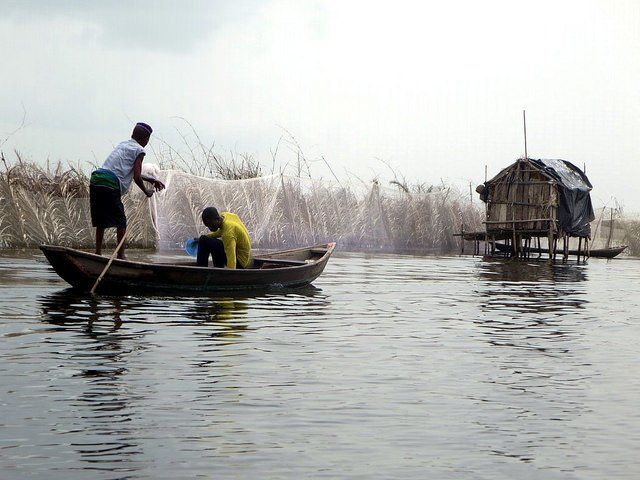I can’t think of anything more calming than watching and listening to the ocean’s waves, those great bands of water rising and falling.
Just plop me down on a shore, get rid of all my personal responsibilities, and I’ll stay there for eternity, achieving enlightenment.
In the course of my meditation, I’d probably think about the world underneath the surface of the waves, all the organisms living in vast harmony.
All the dolphins and shellfish and algae and tuna and snails.
What are they up to, I’d wonder. How are those guys doing?
And then I’d do a quick search on my smart phone and get stressed out, ruining everything.
Apparently, “over the past 200 years, the world’s seas have absorbed 150 billion metric tons of carbon from human activities,” according to a recent piece in The New York Times.
That’s 15 pounds of carbon per person, per week, which is enough fuel to circle the globe in a coal train 13 times.
And this carbon dissolves as carbonic acid, which at such large scales changes the water, making it acidic.
Here are 5 reasons why the world should be worried about this growing acidification, especially in relation to poverty.
Food supply
The first things that acidification affects are the smallest creatures of the ocean: the shellfish, coral and other small organisms.
Acidified water makes it hard for these organisms to spawn and then grow. Oftentimes, they’ll simply dissolve before they become sturdy enough to thrive.
This is bad not just because some of these organisms (shellfish) are a source of food for humans, but they also feed bigger fish such as salmon that are a primary source of food.

15 percent of the world receives a third of their daily protein intake from fish and more than a billion people depend on fish as their primary source of protein.
Overfishing is already imperilling the world’s fish populations. Back in 2011, the UN’s Food and Agriculture Organization estimated that 32 percent of fish populations were being depleted and needed to be urgently rebuilt.
So fish are being depleted from above by fishing and from below by acidification, while demand for fish grows.
Jobs
The livelihoods of an estimated 540 million people are directly supported by fisheries and aquaculture.
And it’s not just fishermen and women. Fish distributors, markets, restaurants and all the jobs that branch off these fields will be affected.
This is an issue in developed nations as well. In the US state of Alaska, more than 100,000 jobs are supported by fishing.
Fishing is especially important for people in developing countries who often use the sea as a way to stay ahead of poverty.

All in all, fish are the most-traded food commodity in the world.
Ultimately, acidification threatens to collapse the fishing industry.
Health
Harmful and toxic algal species flourish in acidified waters.
Just like how increased mercury pollution first contaminates small creatures and then makes its way to predators, ending with humans, these toxic species will climb up the food chain.

Marine species can be killed, or they will harbor the toxins to be later absorbed by humans.
I buy tuna supported by the World Wildlife Fund because it's ethical and has lower mercury concentration, but how will the fish industry respond to pervasive toxins from algae?
Climate change
The oceans are the biggest carbon sink in the world, storing way more carbon than the Amazon rainforest. Coastal areas absorb carbon dioxide 50 times faster than some rainforests.
The oceans can’t store carbon indefinitely and remain intact. Eventually they will reach a tipping point. As the ocean acidifies, it may stop releasing a form of sulfur that acts to cool the atmosphere, intensifying climate change.

Also, as coral reefs dissolve, the range of places where carbon can be stowed will diminish.
For example, the Great Barrier Reef has been cut in half since the 1990s.
Climate change primarily affects the world’s most vulnerable populations. The rise of droughts, floods and large storms, triggered by climate change, will be concentrated in some of the poorest regions in the world.
Land ecosystems
Humans aren’t the only land creatures that depend on the oceans.
Nearly every land animal you can think of--from bears to birds--depends in part on the oceans, either directly or indirectly.
If fish populations continue to decline from acidification, overfishing, pollution and other factors, these creatures will see their diets changing.
And, of course, this in turn affects human diets by disrupting ecosystems.
The more climate change progresses, the more the world sees the delicate interconnectivity of all life on Earth.
So what can be done?
As The New York Times piece describes, much more funding has to be given to marine research teams.
When measurements become more widespread and yield more data points, better policies can be recommended and legislators will be more open to them.
You can’t really argue with this kind of approach and use of hard data.
Countries have to do a better job at collaborating and sharing data, because this is a global problem.
Fisheries have to be rehabilitated, whether by fostering better conditions for marine life or by imposing fishing restrictions to allow populations to revive.
Finally, economies have to be restructured to limit CO2 emissions. World leaders are meeting this December in Paris. They have to make bold proposals to invest in green energy and environmentally friendly practices.
You can go to TAKE ACTION NOW to spur leaders to embrace Global Goal 15: Life in the Oceans.